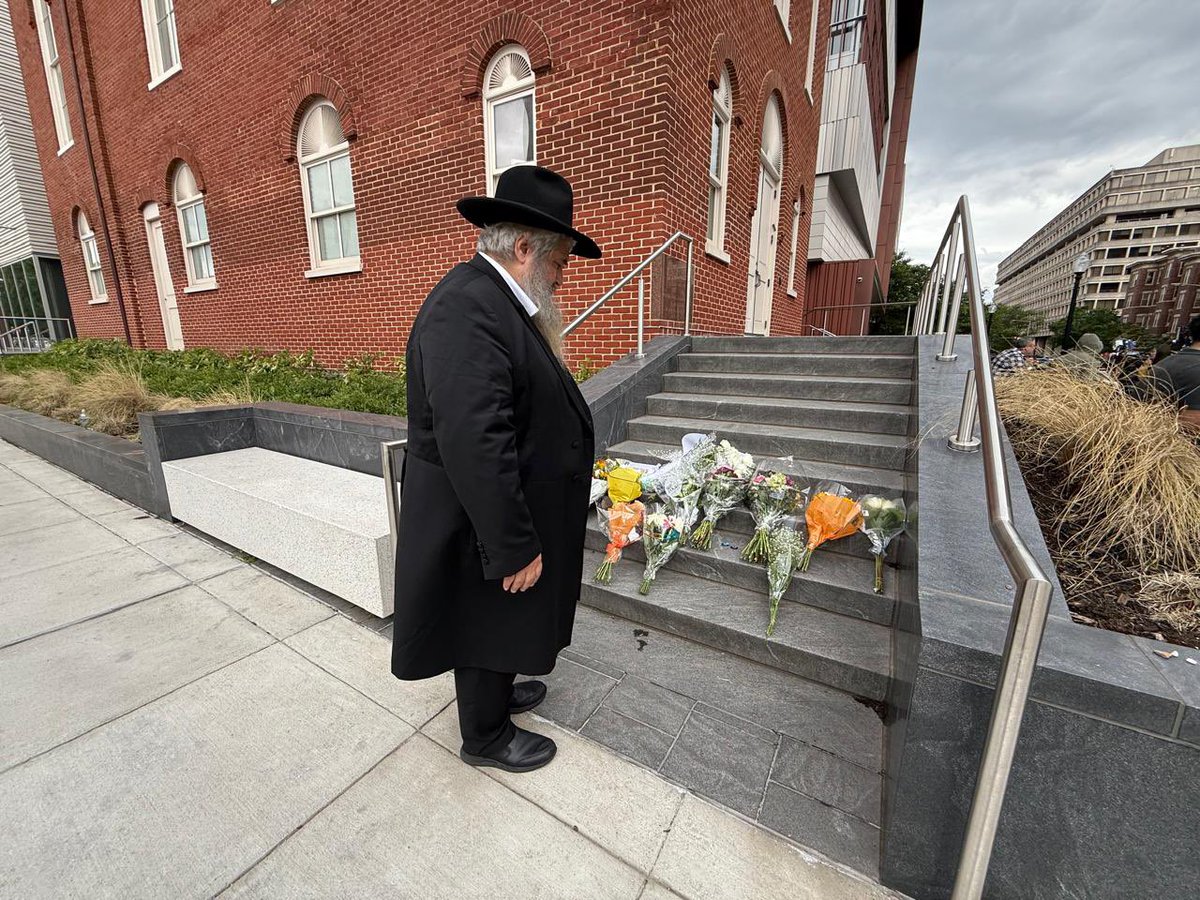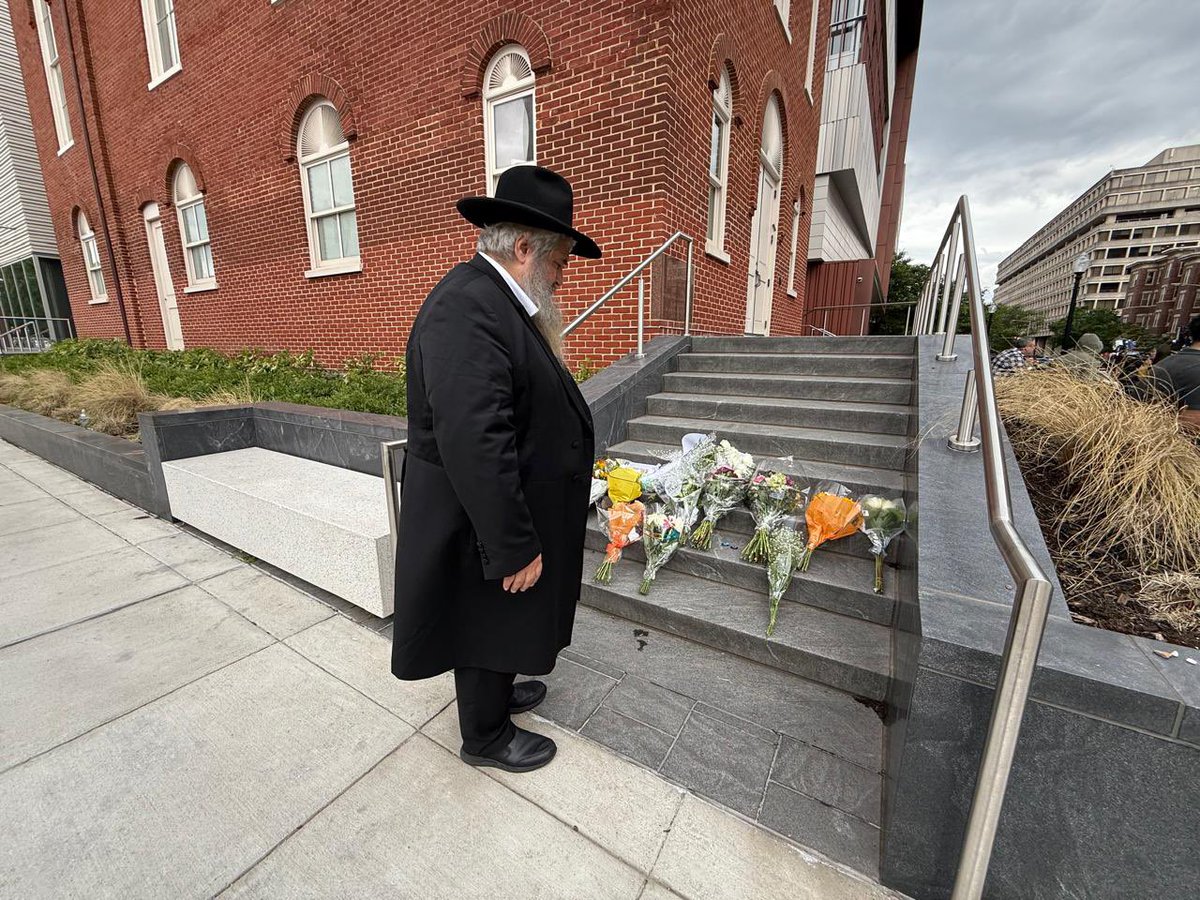Brutal Murder of Jewish Couple Sparks Outrage Over Rising Hate
Honoring the Memory of Yaron and Sarah: A Reflection on Hate Crimes and Global Antisemitism
In a poignant social media post, Chief Rabbi Moshe Azman of Ukraine paid tribute to Yaron and Sarah, a Jewish couple tragically murdered in Washington, D.C. by an individual who espoused extremist views associated with the "free Palestine" movement. This heartbreaking incident underscores a disturbing trend of antisemitism and violence against Jewish individuals worldwide. In this summary, we examine the implications of this crime, the rise of antisemitism, and the importance of remembrance and education in combating hate.
The Brutal Murder of Yaron and Sarah
Yaron and Sarah were victims of a hate crime solely based on their Jewish identity. The Chief Rabbi’s tweet emphasizes the brutal nature of their murder, highlighting how they were targeted not for any wrongdoing but merely for being Jews. Such incidents are not isolated but rather part of a larger, global wave of antisemitism that has been intensifying in recent years. The Rabbi’s heartfelt tribute serves as a reminder of the human cost of hatred and the urgent need for societal change.
The Ideology Behind the Violence
The individual responsible for this heinous act was reportedly influenced by a radical ideology that promotes violence against Jews under the guise of political activism. The phrase "free Palestine" has been co-opted by some factions to justify acts of violence against Jewish communities, creating a dangerous narrative that equates Jewish identity with oppression. It is crucial to differentiate between legitimate criticism of Israeli policies and acts of antisemitism that seek to dehumanize and endanger Jews worldwide.
- YOU MAY ALSO LIKE TO WATCH THIS TRENDING STORY ON YOUTUBE. Waverly Hills Hospital's Horror Story: The Most Haunted Room 502
A Global Wave of Antisemitism
Rabbi Azman’s statement points to a concerning global trend: the rise of antisemitic sentiments and violence. Reports indicate that antisemitic incidents, including vandalism, harassment, and physical assaults, have surged in various parts of the world. This increase is often fueled by social media, where hateful ideologies can spread rapidly and incite violence. The murder of Yaron and Sarah is not just a tragic event; it is a stark indicator of the broader societal issues that need addressing.
The Role of Education in Combating Hate
To effectively combat antisemitism and other forms of hate, education plays a pivotal role. Understanding the history and experiences of Jewish communities can foster empathy and counteract ignorance. Educational programs that promote tolerance and diversity can help dismantle prejudiced views and encourage dialogue between different cultural and religious groups.
The Importance of Remembrance
Honoring the memory of victims like Yaron and Sarah is essential in the fight against hate. Memorials and commemorative events can help raise awareness about antisemitism and its impact on individuals and communities. By sharing stories of those who have suffered from hate crimes, society can reinforce the message that such violence is unacceptable and must be confronted at every level.
Community Solidarity
In response to incidents of antisemitism, community solidarity is vital. Interfaith and multicultural initiatives can bring people together to stand against hate. When diverse communities unite to condemn violence and promote understanding, they create a powerful counter-narrative to the divisive ideologies that fuel hatred. The Chief Rabbi’s tribute serves as a call to action for individuals and communities to work together in fostering a more inclusive and understanding society.
The Role of Social Media
Social media platforms have become a double-edged sword in the fight against antisemitism. While they can be used to spread awareness and promote positive messages, they also serve as breeding grounds for hate speech and radical ideologies. It is imperative for social media companies to take responsibility for monitoring and removing antisemitic content to prevent the incitement of violence.
Conclusion: A Call to Action
The tragedy of Yaron and Sarah’s murder is a stark reminder of the consequences of unchecked hatred. As we honor their memory, we must also recognize the global rise of antisemitism and the urgent need to combat it through education, community solidarity, and remembrance. By standing together against hate and promoting understanding, we can work towards a future where individuals are not targeted for their identity but are celebrated for their diversity.
Together, let us ensure that the legacy of Yaron and Sarah, and all victims of hate crimes, serves as a catalyst for change in our societies. It is our collective responsibility to create an environment where love, tolerance, and respect prevail over hatred and violence.

I honored the memory of the Jewish couple Yaron and Sarah who were brutally murdered by a terrorist in Washington, D.C., a follower of the ideology of the so-called “free Palestine.” They were killed just for being Jews!
This crime is part of a global wave of hatred that is fed… pic.twitter.com/iL9FPZimQS
— Chief Rabbi Of Ukraine Moshe Azman (@RabbiUkraine) May 23, 2025
I honored the memory of the Jewish couple Yaron and Sarah who were brutally murdered by a terrorist in Washington, D.C., a follower of the ideology of the so-called “free Palestine.”
It’s hard to encapsulate the heartbreak and outrage that comes with the news of tragedies like the murder of Yaron and Sarah. These two individuals were not just victims of a crime; they were human beings who had lives, dreams, and families. In a world where hatred seems to be escalating, the loss of Yaron and Sarah highlights the tragic reality that there are people who are targeted simply for being who they are—Jews. The words shared by Chief Rabbi Moshe Azman resonate deeply: “They were killed just for being Jews!” This isn’t merely a statement; it’s a call to honor their memory and understand the context in which this violence occurs.
This crime is part of a global wave of hatred that is fed
When we say that this crime is part of a global wave of hatred, we’re not exaggerating. The increase in antisemitic incidents around the world is alarming. From Europe to the United States, reports show a troubling rise in attacks against Jewish communities. The sentiment that fueled the tragic events in Washington D.C. is not isolated; it’s part of a broader narrative that dehumanizes individuals based on their identity. This ideology, cloaked in political discourse, often manifests in violence, making it critical for us to address these issues head-on.
The ideology of “free Palestine,” while rooted in a genuine desire for justice and sovereignty for Palestinians, can sometimes be twisted to justify acts of violence against Jewish individuals. This unfortunate reality necessitates a dialogue that differentiates between legitimate political activism and the harmful rhetoric that incites violence. It’s vital to engage in discussions that promote understanding rather than division. We need to ask ourselves: how can we advocate for peace and justice without resorting to hatred against another group?
Understanding the impact of rising antisemitism
The impact of rising antisemitism is profound, not just on individuals and families but also on communities as a whole. Imagine living in constant fear of being targeted for who you are. This is the reality for many Jews today. The murder of Yaron and Sarah is a stark reminder of how quickly hatred can escalate into violence. It serves as a wake-up call for all of us to stand against bigotry, wherever we see it.
Organizations like the Anti-Defamation League (ADL) are working tirelessly to combat antisemitism and promote education about Jewish history and culture. Through their initiatives, they aim to create a world where people of all backgrounds can coexist peacefully. Engaging with these organizations and supporting their causes can be a meaningful way to honor the memory of those lost to hate crimes.
Taking action against hate
If you’re feeling overwhelmed by the state of the world, you’re not alone. It’s easy to feel powerless in the face of such tragedy, but there are ways to take action. One of the most impactful things you can do is to educate yourself and those around you. Understanding the historical context of antisemitism can help dispel myths and stereotypes that fuel hatred.
Additionally, consider supporting local Jewish communities and organizations. Whether it’s attending events, volunteering, or simply showing solidarity, your involvement can make a difference. Social media can also be a powerful tool for advocacy. Sharing stories, articles, and resources can help raise awareness and foster dialogue.
The role of community in healing
Communities play a crucial role in healing after such devastating events. The mourning process is often collective, and the support of community members can provide comfort in the wake of tragedy. It’s essential for communities to come together to honor the memories of those lost to hate crimes. Vigils, memorials, and educational forums can be powerful ways to foster healing and promote understanding.
Moreover, it’s important for community leaders to engage with one another, regardless of different backgrounds or beliefs. Building bridges between communities can help dismantle the stereotypes and misconceptions that often lead to violence. In times of strife, unity can be a powerful force against hatred.
Encouraging dialogue and understanding
To combat hatred effectively, we must encourage open dialogue. Engaging in conversations about sensitive topics like antisemitism and violence requires empathy and understanding. It’s crucial to approach these discussions with a willingness to listen and learn.
Educational institutions can play a vital role in this process. By integrating lessons on tolerance, diversity, and the dangers of hate into their curricula, schools can help shape a future generation that values understanding and compassion. Workshops, guest speakers, and discussions can provide students with the tools they need to navigate these complex issues.
The importance of remembrance
Remembering Yaron and Sarah isn’t just about reflecting on their tragic end; it’s about celebrating their lives and the impact they had on those around them. It’s about ensuring that their story is not forgotten, and that we learn from it. Memorials and tributes can serve as powerful reminders of the consequences of hatred and the importance of standing against it.
We can also honor their memory by committing ourselves to advocacy and support for those who are marginalized. Recognizing the humanity in every individual, regardless of their background, can help create an environment where love and acceptance triumph over hate.
Conclusion: A call to action
In times of darkness, it’s essential to shine a light on the values that bring us together: compassion, understanding, and love. The tragic murder of Yaron and Sarah is a reminder of the work that still lies ahead in combating hate. By honoring their memory through action, dialogue, and community engagement, we can strive for a world that celebrates diversity rather than fears it.
Let’s remember that every action counts, and every voice matters in this fight against hatred. Together, we can create a future that honors the memories of those we’ve lost and builds a foundation for peace and understanding. In the face of adversity, let us stand united, fostering a culture of respect and dignity for all.

